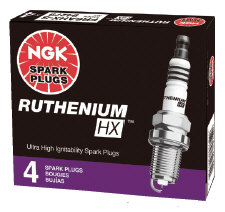
Home, Auto Repair Library, Auto Parts, Accessories, Tools, Manuals & Books, Car BLOG, Links, Index

Spark plugs continue to evolve with new alloys that offer longer service life, better spark propagation and better performance. NGK recently introduced their next-generation spark plugs which feature electrodes made of the precious metal ruthenium. Ruthenium melts at 4233 degrees F (2334 degrees C), which is actually slightly lower than that of iridium. But when alloyed with other metals, it becomes much more resistant to corrosion and oxidation than current iridium and platinum alloys.

The new NGK RUTHENIUM HX spark plugs include 25 part numbers that cover over 200 million vehicle applications. NGK says performance long life plugs (platinum and iridium) are currently used in 52 percent of 2005 to 2018 vehicles. The market for such plugs is expected to grow to 60 percent of all new vehicle production by 2020. Auto makers use these type of plugs because they can usually go up to 100,000 miles between changes. NGK says their new RUTHENIUM HX plugs will last even longer.

NGK says ruthenium electrodes provide higher ignitability, enhanced oxidation resistance and increased durability for today�s modern engines. Testing has shown that ruthenium alloy electrodes are capable of providing up to 2X the service life of iridium spark plugs, and 4X the service life of standard nickel electrode spark plugs. The physical properties of ruthenium and the specialized electrode designs of the new plugs allows them to outlast current platinum and iridium plugs by a significant margin. It's possible that ruthenium plugs may become "lifetime" plugs that never have to be replaced. Time will tell.
NGK says ruthenium plugs are "high ignitability" plugs that guarantee maximum combustion efficiency to ensure the most complete fuel burn (reduced emissions), quicker throttle response, faster acceleration, smoother idle and better cold starting.
NGK's new RUTHENIUM HX spark plugs come with two different electrode designs: Double Fine Electrode (DFE) for non-turbo applications, and Projected Square Platinum Electrode (PSPE) for turbocharged engines.

 Ignition Related Articles:
Ignition Related Articles: Click Here to See More Carley Automotive Technical Articles
Click Here to See More Carley Automotive Technical Articles